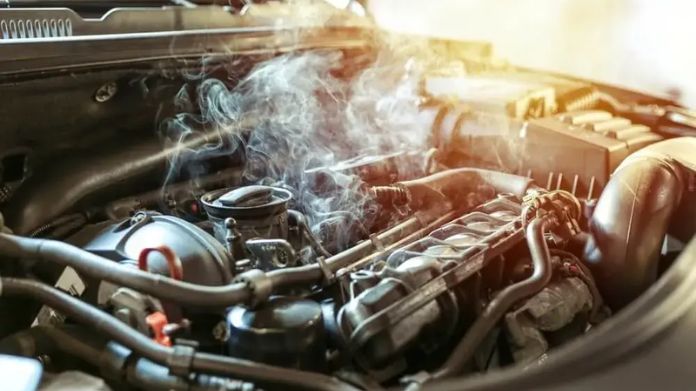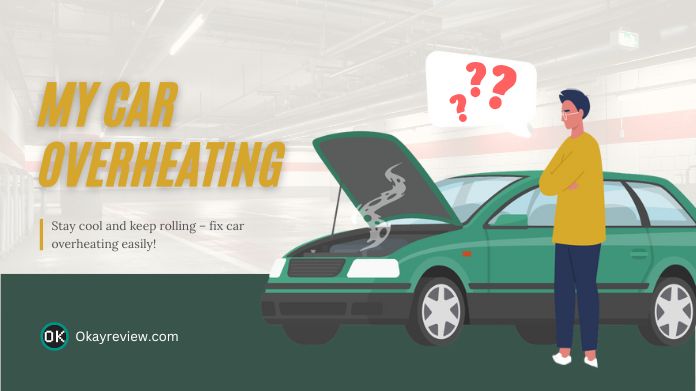Have you ever noticed the temperature indicator on your car start to creep toward red as you were driving? Although nobody wants to deal with it, knowing why it occurs may spare you a lot of trouble.
The cooling system in your automobile is essential for controlling the temperature of your engine. Car overheating can result in costly repairs and significant engine damage when it breaks.
This post will discuss the typical reasons why cars overheat, how to resolve them, and how to avoid this problem in the future.
Let’s explore reasons and valid solutions for car overheats with Okayreview.com.
Table of Contents
What Happens When a Car Overheats?
When a car overheats, it means the engine’s temperature has exceeded its safe operating range. Maintaining the engine’s temperature is the goal of the cooling system, which consists of parts including the water pump, coolant, radiator, and thermostat.
If any part of this system malfunctions, the engine can’t cool down properly. Ignoring overheating may lead to serious problems like cracked engine blocks, distorted cylinder heads, or even a burst head gasket.
These repairs might leave you stuck at the most inconvenient times and are expensive.
Why is My Car Overheating? Common Causes

1. Low Coolant Levels
Your engine’s coolant is its lifeblood. But what happens when there’s not enough? One of the most frequent causes of car overheating is low coolant.
This may occur as a result of just forgetting to top off the coolant or from leaks in the water pump, hoses, or radiator.
How to Fix It?
Start by checking the coolant reservoir under the hood. If the level is low, refill it with the appropriate coolant-water mixture recommended by your car’s manufacturer.
Look for visible leaks under the car or around the engine bay. If you find a leak, have it repaired by a professional mechanic as soon as possible.
1. A Faulty Thermostat
The thermostat acts as the traffic controller for your engine’s coolant. Car overheating will result from the coolant not flowing through the engine if it is stuck in the closed position.
On the flip side, if it’s stuck open, the engine may take too long to warm up and still overheat under heavy usage.
How to Fix It?
The thermostat has to be replaced since it is broken. Usually, this is a simple and reasonably priced fix. For instructions on where to find and replace the thermostat, see your vehicle’s handbook or a reliable technician.
1. Radiator Problems
Your radiator is the MVP of heat dissipation. When it’s clogged, damaged, or leaking, your engine has no way to cool down effectively. Additionally, radiator fans that fail to turn on can prevent proper heat dissipation.
How to Fix It?
Inspect the radiator for blockages, leaks, or corrosion. If it’s dirty, a radiator flush can help. Replace damaged radiators or faulty fans to restore the cooling system’s efficiency. If in doubt, seek professional assistance.
1. Water Pump Failure
Without a working water pump, coolant can’t do its job. That’s a recipe for car overheating. The water pump circulates coolant through the engine and radiator, and a malfunction can lead to rapid temperature increases.
How to Fix It?
Coolant leaks and strange engine sounds are indicators of a failed water pump. A skilled technician is the ideal person to manage the complicated process of replacing a water pump.
1. Broken or Leaking Hoses
Hoses might seem like simple components, but they’re crucial for moving coolant throughout the system. A crack, split, or loose connection can stop everything in its tracks.
How to Fix It?
Inspect all hoses for signs of wear, cracks, or leaks. Make sure the clamps are firmly fastened and replace any broken hoses. You may identify problems early by routinely inspecting the hoses.
1. Head Gasket Issues
For every motorist, a burst head gasket is a nightmare. In addition to causing car overheating, it may also cause coolant to mix with engine oil, which would further harm the engine.
How to Fix It?
Repairing a blown head gasket is a complex and costly process that requires professional expertise. If you suspect a head gasket issue, consult a mechanic immediately to prevent further damage.
1. Coolant Quality Issues
Using the incorrect coolant or skipping normal flushes can cause clogs and car overheating. Coolant quality is more important than you realize.
How to Fix It?
Always use the manufacturer-recommended coolant and ensure it’s mixed correctly. Flush and refill the cooling system as part of your car’s regular maintenance schedule.
What to Do If Your Car Overheats?
- Pull Over Immediately: Pulling over safely should always be your first course of action when the temperature gauge climbs. The engine may sustain irreparable harm if you keep driving.
- Turn Off the AC and Turn On the Heater: Turning on the heater helps draw excess heat away from the engine and into the cabin. While it might be uncomfortable, it’s a quick way to cool the engine down.
- Open the Hood (Carefully): Before opening the hood, let the engine cool down. By doing this procedure, heat may escape, and burns from hot components can be avoided.
- Check Coolant Levels: If it’s safe, check your coolant levels. If they’re low, carefully add coolant to the reservoir. Avoid opening the radiator cap while the engine is still hot, as this can cause serious burns.
- Call for Help If Needed: If you’re unable to identify or fix the issue, call roadside assistance or a trusted mechanic for help.
How to Prevent Your Car from Overheating?
- Regular Maintenance: The best way to avoid car overheating is regular care. Small checks can prevent big problems. Stick to your car’s maintenance schedule and address issues promptly.
- Monitor Coolant Levels: Check your coolant levels regularly and top them off as needed. This simple habit can save you from unexpected breakdowns.
- Inspect the Cooling System: Routinely inspect the radiator, hoses, and water pump for signs of wear or damage. Early detection can save you from costly repairs.
- Keep an Eye on the Temperature Gauge: Pay attention to the temperature gauge while driving. If it starts to climb, take action before it reaches the danger zone.
- Avoid Overloading Your Car: Carrying additional weight not only puts strain on your engine, but it can also cause your cooling system to overheat. Travel lightly to keep your automobile functioning smoothly.
Wrapping Up!
An overheated automobile can be stressful, but knowing the reasons and treatments gives you control. You can keep your engine cool and your rides smooth by being proactive with maintenance and understanding how to deal with car overheating conditions.
Follow these suggestions to enjoy worry-free driving!


Great article! Your comprehensive guide on car overheating is incredibly helpful. I appreciate how you’ve covered the possible causes, warning signs, and practical steps to take when it happens. The prevention tips are also super valuable for maintaining a vehicle’s health. Thanks for sharing this useful information!
Thanks for the beautiful comment Isabel. Please suggest us some needs to create and research on such problems.